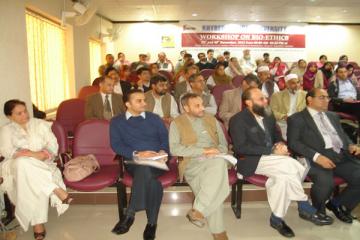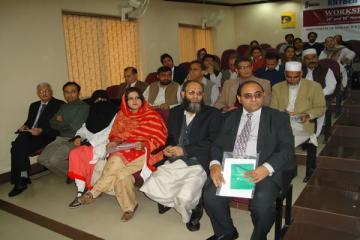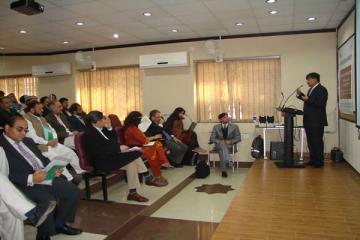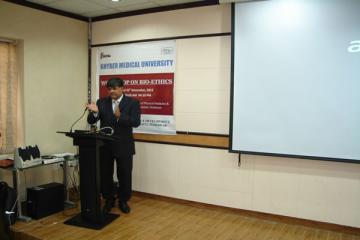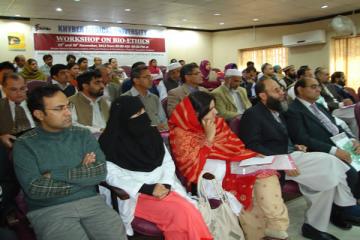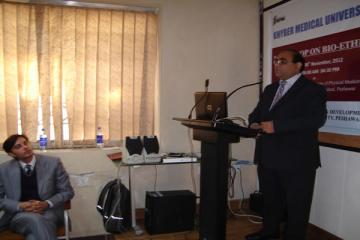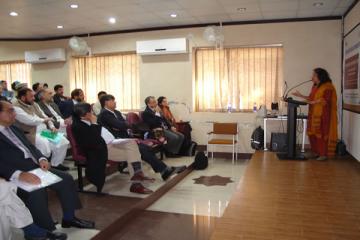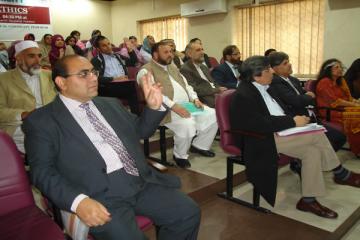KMU Observes Hepatitis C Awareness Day
Khyber Medical University (KMU), in collaboration with Association of Physicians of Pakistani descent of North America (APPNA) and Islamic Relief (IR-USA) has organized Hepatitis C day at Institute of Physical Medicine & Rehabilitation (IPM&R), Peshawar. Prof. Dr. Shad Muhammad Director Academics and Admissions KMU was the chief guest while Renowned Physician Prof. Dr. Javed Iqbal Farooqi delivered a though provoking lecture on the issue. Beside others Director R&D Prof. Dr. Mukhtiar Zaman and Consultant R&D Dr. Tasleem Akhtar were also present at this occasion.
The objectives of organizing this day was to spread awareness regarding safe blood transfusion, proper medical waste disposal and disinfection of surgical tools while mobilizing masses in the efforts against the spread of Hepatitis C.
While delivering his lecture on transmission, symptoms and prevention of Hepatitis C, Prof. Dr. Javed Iqbal Farooqi said, Hepatitis C is a viral disease which means swelling of the liver that persists longer than six months. Notably, one of the most common causes of chronic hepatitis are viral infection, alcohol, drugs, chemicals, fatty liver and autoimmune disease.
He stated that according to World Hepatitis Alliance, currently, around 500 million people are infected with either chronic Hepatitis B or C and 1 in 3 people have been exposed to one or both viruses. Hepatitis C is caused by the virus HCV. It also spreads through contact from an infected person`s blood, semen, or body fluid. Hepatitis C can cause liver damage that can lead to cancer. About 150 million people are chronically infected with hepatitis C virus, and more than 350000 people die every year from hepatitis C-related liver diseases.
Prof. Dr. Javed Iqbal Farooqi said countries with high rates of chronic infection are Egypt (22%), Pakistan (4.8%) and China (3.2%). The main mode of transmission in these countries is attributed to unsafe injections using contaminated equipment. Hepatitis can occur through receipt of contaminated blood transfusions, blood products and organ transplants, Injections given with contaminated syringes and needle-stick injuries in health-care setting and Injection drug use being born to a hepatitis C-infected mother.
Hepatitis C may be transmitted through sex with an infected person or sharing personal items contaminated with infectious blood, but this is less common. Hepatitis C is not spread through breast milk, food or water or by casual contact such as hugging, kissing and sharing food or drinks with an infected person. About the symptoms of the disease Dr. Javed Iqbal said following initial infection, approximately 80% of people do not exhibit any symptoms. Those people who are acutely symptomatic may exhibit fever, fatigue, decreased appetite, nausea, vomiting, abdominal pain, dark urine, grey-coloured faeces, joint pain and jaundice.
He clarified that there is no vaccine for hepatitis C. The risk of infection can be reduced by avoiding unnecessary and unsafe injections, unsafe blood products, unsafe sharps waste collection and disposal, use of illicit drugs and sharing of injection equipment, unprotected sex with hepatitis C-infected people, sharing of sharp personal items that may be contaminated with infected blood and tattoos, piercings and acupuncture performed with contaminated equipment.
In the end Prof. Dr. Shad Muhammad Dir. AA&QA thanked the participants especially Prof. Dr. Javed Iqbal Farooqi for delivering such an informative lecture and APPNA and IR USA for organizing the day. He urged upon all interested participants and contributors to take part in this cause to spread awareness about Hepatitis C. He hoped that all the concern quarters will play their due role in preventing the population from this epidemic through active participation in the awareness campaign. He also ensured that KMU and its constituent institutes are well aware of their social responsibilities and will continue its efforts in this regard

